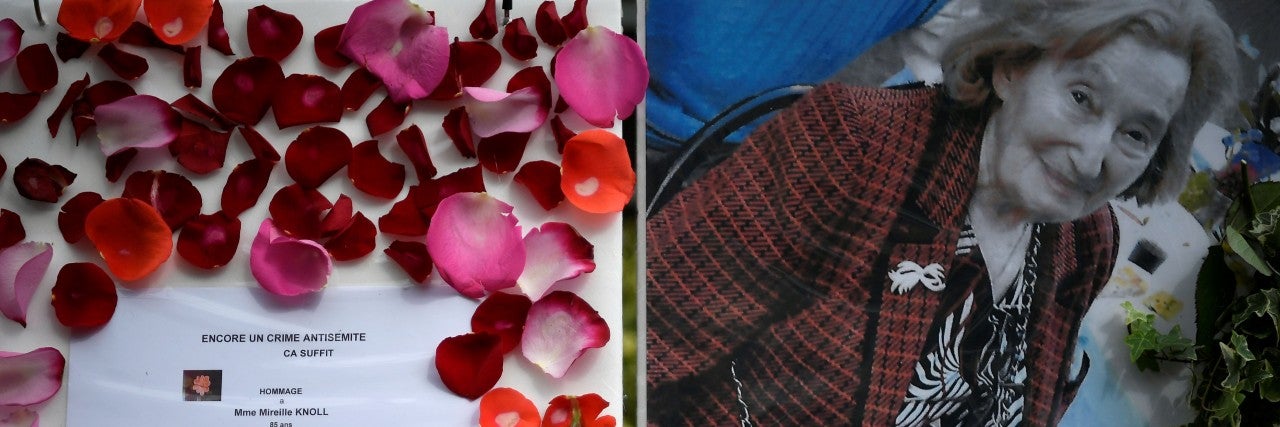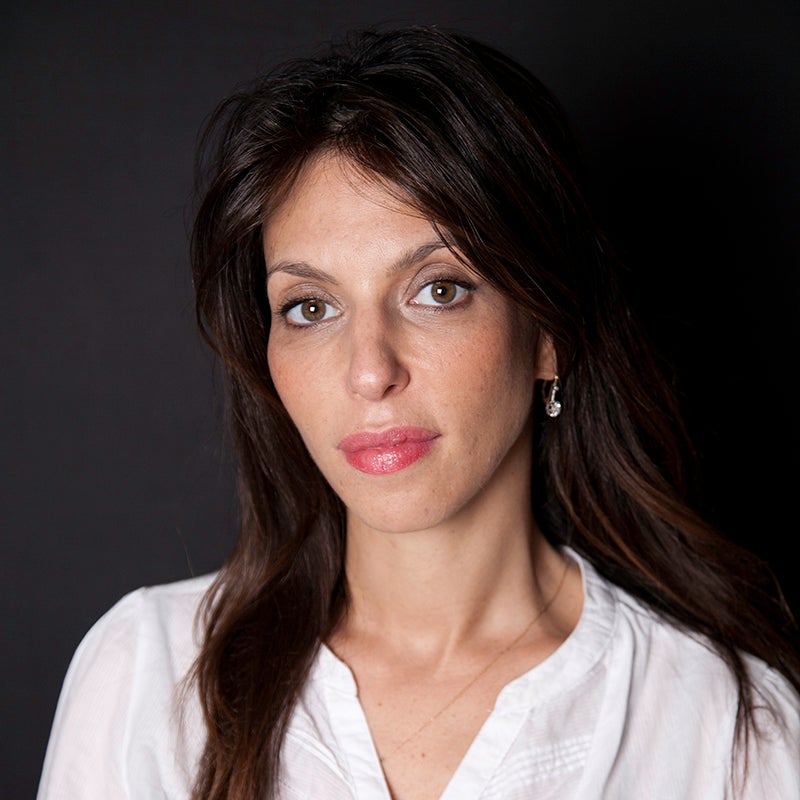March 27, 2018 — Paris
This piece originally appeared in Huffington Post France.
Mireille Knoll was 85 years old. Born in 1932 in Paris, she owed her life to a miracle, managing to escape the roundup of the Vel d’Hiv with her mother in 1942. She found refuge in Portugal and came back to Paris after the war, where she married an Auschwitz survivor. 76 years later, on March 23, the devil that she escaped from came back to end her life. Mireille was found dead in her apartment, burnt after having been stabbed 11 times. According to her granddaughter, who lives in Israel, everything else in her apartment was burnt as well, “leaving the family with no memories, no photo albums, no letters, nothing. The only thing that we now have are our tears,” she wrote in her Facebook post.
Mireille Knoll’s murder haunts me. It is a painful reminder (as if we needed one) of the face of antisemitism in France today, where a helpless and sick 85-year-old Holocaust survivor can be killed in her apartment for one reason only: because she is Jewish.
Mireille’s murder also reminds me of another recent antisemitic murder. Nearly one year ago, on April 4, 2017, a retired Jewish school teacher by the name of Sarah Halimi was killed in her apartment by a radicalized neighbor. He had beaten her nearly to death before finally throwing her out of the window. At the time, all of France should have reacted with shock, and should have risen up asking for truth and justice. But not much happened. We were in the middle of a risky presidential campaign in which Emmanuel Macron was facing far-right candidate Marine Le Pen. It took months until the mobilization of Jewish institutions, courageous and principled intellectuals, and finally President Macron himself got the media to shine a light on this horrible antisemitic murder. And even then, it took the courts nearly a year—after an exhausting back-and-forth between the family, the Jewish communal bodies, the prosecution, and the judges—for the latter to recognize antisemitism as a motive for Sarah’s murder.
With Mireille Knoll, it seems that some of lessons have been learnt: the judicial authorities have reacted quicker, even though we will still have to await the results of the trial. The prosecutor has announced that the antisemitic motive will be taken into consideration, and two suspects, one of them a neighbor whom she had known since he was a child, have now been charged. The media have reacted faster as well.
But a fundamental question remains: will France’s civil society finally wake up? Will it understand that the hate that kills today, and that has killed 11 French citizens since 2006 simply because they were Jewish, is not just “a problem for the Jewish community,” as the French media have a tendency to put it, but that it is a problem for France, for the Republic, for everything this country stands for and was built upon? As the great French intellectual Jean-Paul Sartre used to say, “not one single Frenchman will be safe, in France or anywhere else in the world, as long as a Jew will fear for his life.”
Former Prime Minister Manuel Valls and others have understood that “France without the Jews is not France anymore,” just as Emmanuel Macron said only a few weeks ago : "We must never falter and we will never falter in the denunciation of antisemitism and in the fight against this scourge, there is no accommodation, no prohibition of language, no blindness possible, whatever the form that they take insult to aggression, stigma to murder, antisemitism is the opposite of the Republic. It is the dishonor of France. And we fight every day for a Republic of honor and fraternity, so we fight every day antisemitism in all its forms."
Those declarations are strong and they help French Jews feel less lonely, but it is not enough for them not to feel apart. Many French Jews believe that while they have tried to warn their fellow citizens that this hatred will spread and ultimately attack French people everywhere, only few have listened. Thus the question that haunts so many of us French Jews is, How many people were in the streets after the murder of Ilan Halimi in 2006? How many were there after three Jewish schoolchildren and a father were killed by a terrorist in Toulouse in 2012? And how many would there have been had it only been the kosher supermarket that was attacked and not also Charlie Hebdo? And how many were there last year after the murder of Sarah Halimi? The answer is a few hundred at best, and most of them Jewish.
The words of the government are welcome and essential. They build trust in the authorities’ determination to fight this scourge. But so long as French citizens and the larger civil society do speak out with a strong voice, as brothers, in solidarity with French Jewish citizens when such horrific crimes occur, those Jews will feel lonely, separated from the national community. The fight against antisemitism was declared a national cause by former President Hollande. Now we need more people to feel moved, concerned, and therefore take an active part in this fight. This is not just a matter of fighting “in solidarity” with the Jewish community; it is the whole French community’s own fight as well. It must be. When antisemitic violence grows, democracy is at stake. When Islamists, for whom antisemitism is at the core of their ideology, attack Jews, down the road they will end up attacking women, gays, journalists, soldiers, policemen—they will attack all of France. Indeed, every French citizen, every European, every democratic voice, every defender of human rights, should be worried for their future. Such attacks deeply wound the foundation of the universal values that Western countries share and in which Western people believe.
The Jew-hatred that kills today is the same that killed ten other Jews before Mireille. The hatred that killed Jews in the Hyper Casher in Paris is the same that killed four people in the supermarket of Trebes, it is the same hatred and ideology that took the life of France’s National hero Arnaud Beltram, the policeman who swapped places with a hostage and was consequently killed by a terrorist, who will receive a national funeral on Wednesday morning in the presence of President Macron.
Immediately after commemorating Arnaud Beltram’s memory, we will march to honor the memory of Mireille Knoll.
It was a long time ago, on May 15, 1990, when 200,000 people demonstrated against antisemitism after the desecration of the Jewish cemetery of Carpentras. That was the last great moment of French solidarity with its Jewish citizens, in support of France's values. I think of it with great nostalgia, and wonder whether anything like it can happen again. Maybe this Wednesday….
Simone Rodan-Benzaquen is Director of AJC Europe.



